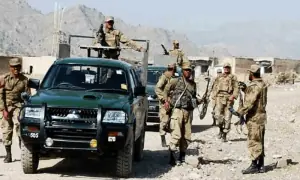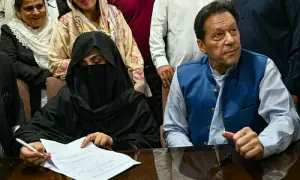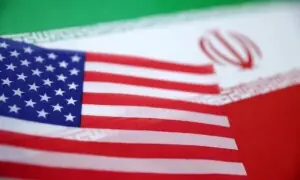Modi commissions India’s first home-built aircraft carrier in defence push
3 min readIndian Prime Minister Narendra Modi commissioned the country’s first home-built aircraft carrier on Friday, underlining his government’s efforts to boost domestic production to supply a military deployed on two contentious borders.
After 17 years of construction and tests, Modi commissioned the INS Vikrant — the navy’s second operational aircraft carrier and the largest warship ever built in India — at a state-run shipyard in the south.
“Today, India has joined those countries in the world which can manufacture such a huge aircraft carrier with indigenous technology,” Modi said.
“It is a symbol of indigenous potential, indigenous resources and indigenous skills.”
Designed to accommodate a crew of about 1,600 and a fleet of 30 aircraft, the Vikrant will rely on Russian-designed MIG-29K aircraft that already operate from India’s other carrier, the INS Vikramaditya, which India bought from Russia.
Boeing and France’s Dassault are seeking to provide India with more than two dozen jets for the Vikrant.
India is one of the world’s largest arms importers, spending $12.4 billion between 2018 and 2021, but it has been seeking to develop its own manufacturing capabilities as a key supplier Russia fights a war in Ukraine and faces sanctions.
India has identified some 8,000 imported defence items worth about 82 trillion rupees ($1.03 trillion) in 2022-23 that it wants its firms to make, according to the defence ministry.
India employs 1.38 million people in its armed forces, with large numbers deployed on borders with nuclear-armed rivals China and Pakistan.
“India is working with all its might to become self-reliant,” Modi said, referring to the home-built Tejas light-combat aircraft and artillery.
The Vikrant will significantly add to India’s maritime capabilities, allowing the navy to operate an aircraft carrier on each seaboard, alongside its 10 destroyers, 12 frigates and 20 corvettes.
China, which also has two operational carriers and is working on a third, has a much larger fleet of 335 vessels, including about 48 destroyers, 43 frigates and 61 corvettes.
“Security concerns in the Indo-Pacific region and the Indian Ocean have long been ignored,” Modi said. “But today this area is a major defence priority for our country.”
‘Sign of our subjugation’
Friday’s commissioning ceremony also saw the unveiling of a new naval flag without a British colonial symbol left over from India’s colonial era.
The new ensign replaces a prominent Saint George’s Cross, the national flag of England, with the royal seal of the Hindu warrior-king Chhatrapati Shivaji.
“It is a historic date, we’ve made history and discarded a sign of our subjugation,” Modi said during his address.
Shivaji is lauded by many for challenging the Muslim Mughal dynasty, which ruled much of the subcontinent prior to British colonisation, and which Hindu nationalists see as an era of foreign subjugation.
The ruling Bharatiya Janata Party has also backed a $300 million, a 210-metre-tall statue of Shivaji off the coast of Mumbai, to be unveiled later this year.
For the latest news, follow us on Twitter @Aaj_Urdu. We are also on Facebook, Instagram and YouTube.




























Comments are closed on this story.